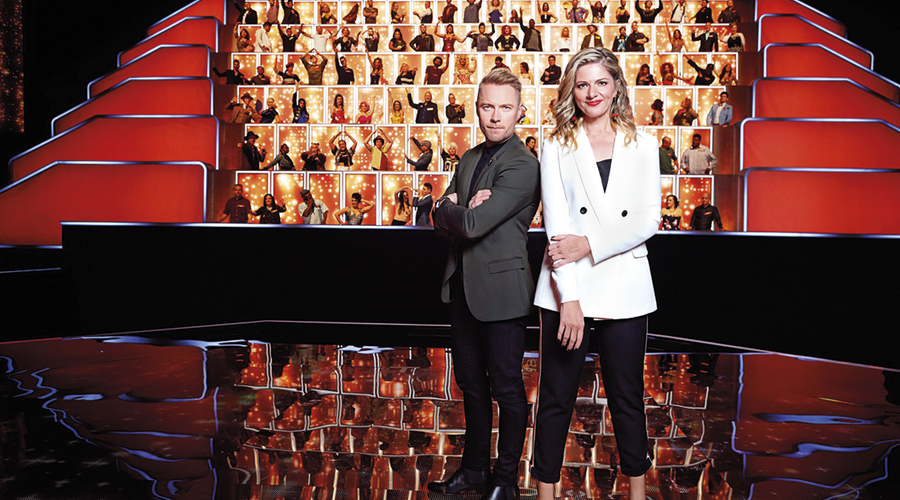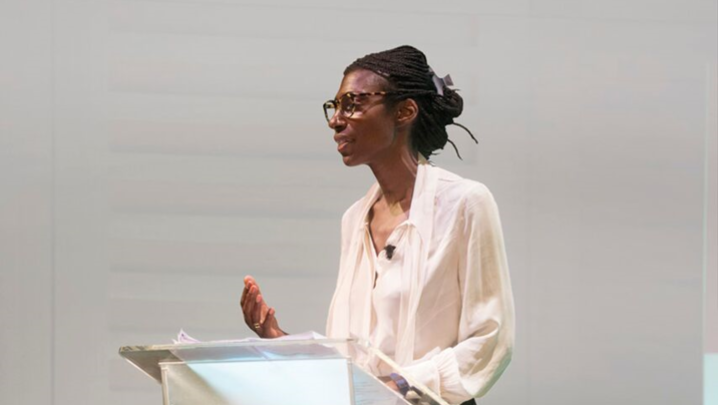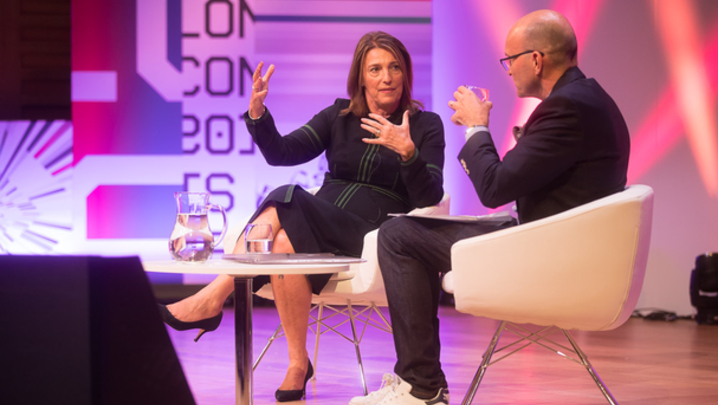Matthew Bell takes stock as producers share strategies for winning in a fast-evolving market
Two programme “sellers” occupied the chairs vacated moments before by “buyers” from the broadcasters and Amazon in the previous discussion. Endemol Shine’s Peter Salmon and NBCUniversal’s Jeff Wachtel are TV veterans. After decades in the business, one could forgive them a little world-weariness. Yet both had clearly been energised by an industry currently in a state of ferment.
“It’s almost numbing, the pace of change and the revolutionary climate we are in right now,” said Wachtel. “There’s never been a time like this.”
“The world is changing,” agreed Salmon. “You’ve got to be in the game. You want to be part of a big gang. You’ve got to bring it on.”
Wachtel, who is based in London, runs the television side of NBCUniversal’s international business, which includes the UK indies Carnival Films (Downton Abbey) and Monkey Kingdom (Made in Chelsea).
The exec took up his present role in January, moving from Los Angeles, where he had been working as NBCUniversal Cable Entertainment’s chief content officer.

He argued that programme-makers in the US had picked up production methods from the UK: “The US has been moving towards the UK model for a long time”, with shorter series supplanting longer seasons of shows. “When I started, 25 years ago, we were talking about what happens in episode 100. Nobody talks about that any more.”
Wachtel brought with him a clip of Safe Harbour, “an absolutely beautiful piece of local programming”, made by NBCUniversal’s Australian indie Matchbox Pictures.
The critically acclaimed, four-hour series about asylum seekers, said Wachtel, cost “one-third of one episode of The Crown. We would have liked to have had a little bit more money, but it turned out that we didn’t need it. If you’re doing The Crown, you need to spend $10m an episode.”
Yet, despite its small budget and local subject, Wachtel was convinced that the drama would also sell globally.
The world of TV distribution – thanks to SVoD outfits such as Netflix, which he described as “enablers” – has changed.
“Before Netflix, no one was talking about global content”
said Wachtel. However, he coined a new, less positive, word – “fradversary” – to describe the SVoDs: “They were very seductive at first; they paid us incredible amounts for second [release] windows. They were an enabler, but now they are, for many people, moving a little bit more towards the adversary category.”
“So it’s more like Jaws – they’re coming after you?” wondered session chair Kirsty Wark. “Ah, but if the shark fed you first…” quipped Wachtel.
Salmon joined Endemol Shine in 2016 as chief creative officer, after 35 years at Channel 4, Granada and (mostly) the BBC. He sets the super indie’s creative direction globally and runs the UK group, which includes leading production companies such as Kudos and Tiger Aspect. Explaining his role, Salmon said: “Programme-makers need a creative voice in the boardroom.”
Salmon argued that the SVoD and other streaming platforms have provided a much-needed shot in the arm for creativity.
“The pushing against the homogenisation of content, forms of storytelling and voices is incredibly important,” he said. “We work with nearly 300 platforms and the range of stories and voices, in all shapes and sizes, is a glory.”
He showed the conference audience a clip from the Australian version of BBC One’s singing show All Together Now, which Endemol Shine has so far sold to 10 territories.
Worldwide, Endemol Shine’s 120 companies are members of what Salmon described as a “big United Nations of ideas”. He added: “This is our supply chain – it makes a lot of business sense. They come up with ideas that I couldn’t possibly generate, great ideas.”
For a producer, size matters in making the best possible deal for your content.
“You’ve got to be good at making shows but you’ve also got to be good at making deals these days,”
argued Salmon. “One of the reasons producers often like to be in the same hull of a bigger set of companies is that you can use your leverage, clout and knowledge of the market.”
He added: “You want to pitch locally, but you ought to encourage your producers to do a deal centrally. Most of us, as producers, have been pretty desperate to get the gig – I certainly have and have probably given a few things away. That doesn’t best please those back at HQ.”
Channel 5 has axed one of Endemol Shine’s biggest shows, Big Brother, in the UK, yet it still thrives elsewhere. Salmon pointed out that the reality show had been CBS’s number-one programme during the summer, reached a 50% share in Brazil, airs in six versions in India, and has returned to Italy and Germany after taking a breather.
“It’s one of those shows that has its own life,” he said. “The UK is only one of 20 territories this year in which Big Brother has played, which is five more than last year.” Nevertheless, Salmon admitted that it is harder for formats to make their mark now than a decade or so ago.
“The war for attention, given there are [so many] platforms, means that it is harder to command eyeballs,” he said.
“The role of talent, either behind the scenes or in front of the camera, is more and more important. Once upon a time, the format [sold] and the talent was interchangeable.”
Would a format such as The Great British Bake Off work on Netflix? asked Wark. “It might be good for the brand,” proposed Wachtel, who said that SVoDs can bring new viewers to a show.
“You can make a version on Netflix or Amazon [Prime] for Britain,” agreed Salmon, “but the fact is that its roots are in the UK with a quirky, interesting, comedic, eccentric talent, which has given it that particular flavour, and made it this thing that audiences in the UK hold to their hearts.” He conceded, though, that big brands are now traded like sports rights.
Wark made the point that an audience is “agnostic”: “They want the best telly wherever they are going to get it.”
Question & Answer
Q. Ed Shedd, partner, Deloitte: Is this a golden age for producers?
A. Jeff Wachtel: It feels like the golden age is giving way to a gold rush. What might have been an incredible opportunity for people to find platforms and… to make anything [is changing].… Now, there is this panic, a gold rush mentality, and everyone is looking for safety.… People are now afraid to do their own thing and are looking for well-known brands.
A. Peter Salmon: It’s a great time to be a producer… but in terms of making shows, I wonder whether we are embracing technological change… I visit a lot of productions all over the world and they remind me of galleries and locations that I filmed in 20 years ago.… Being braver and making stuff differently and more cheaply wouldn’t half be useful now.
Dealmakers in the spotlight
NBCUniversal, in the guise of its parent company, Comcast, and Endemol Shine have been ever-present in the financial pages over the past few months.
There were two ways to build a business, suggested session chair Kirsty Wark – grow it organically or bulk it up more quickly via a merger or acquisition.
An example of the latter, she said, was Comcast’s campaign to buy Sky. The US giant had been engaged in a drawn-out bidding war for the UK broadcaster against 21st Century Fox.
NBCU’s Jeff Wachtel was cagey about his company’s bid for Sky. All he would confirm was that the European broadcaster was ‘a very exciting company, but I’m not in a position to comment.
It would be wonderful, but that’s a separate thing’. (Four days after the RTS conference, Comcast secured Sky following an auction ordered by the Takeover Panel, which regulates bids for British-listed companies.)
Wachtel added: ‘What we are able to do – and are going to do – is to acquire a number of non-English-speaking territories – you can’t be global unless you are local everywhere. We are going to be growing through acquisition.’
NBCU would be developing its existing production companies, including UK film-maker Working Title, which has made movie classics such as My Beautiful Launderette and Tinker Tailor Soldier Spy.
The real question, he said, was: ‘How do we turn their attention to TV?’
Endemol Shine is looking for a buyer and opened its books to potential buyers during the summer.
ITV is thought to be one of the leading suitors for the company, which makes formats such as MasterChef and dramas Black Mirror and Peaky Blinders.
‘We’re working around the clock at the moment on some of this stuff,’ said chief creative officer Peter Salmon. ‘Ultimately, if you’re in one of our 120 production companies, you [probably] don’t even know we’re up for sale – it’s a management issue.
‘Hopefully, we just keep stocking the pipeline with good shows – that’s all we can do at a production level.’
Session Eight, ‘Making it on the global stage’, was chaired by journalist, broadcaster and writer Kirsty Wark and produced by Alan Clements and Charlotte Elston. The panellists were Peter Salmon, chief creative officer of Endemol Shine Group and Jeff Wachtel, President of NBCUniversal International Studios.







